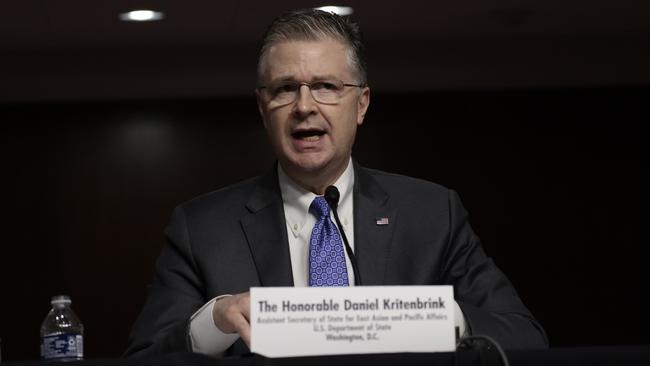Washington opens talks on new trade deal with Taipei
The Biden administration will also conduct freedom-of-navigation exercises through the Taiwan Strait.

The Biden administration will strengthen its trade ties with Taipei and conduct freedom-of-navigation exercises through the Taiwan Strait, as Washington warns that Beijing will further escalate its intimidation campaign against the liberal democracy.
The Tsai administration welcomed the new trade talks as “a big step forward”, with Taiwan’s top trade negotiator John Deng saying he hoped it would lead to a long sought-after free trade deal with the US.
Mr Deng said the US talks would also look at ways to counteract Beijing’s trade coercion, which had been used against Taiwan, Lithuania and Australia.
“Its harm to the global economic and trade order is great,” the Trade Minister said in Taipei.
The new US-Taiwan trade negotiations – which will start in weeks – were announced only a fortnight after Beijing banned Taiwanese biscuits, fish and fruit in an attempt to punish voters in agricultural areas that strongly support Taiwan’s governing Democratic Progressive Party.
The Biden administration’s Indo-Pacific Coordinator Kurt Campbell last Friday said America’s planes and ships would continue to “fly, sail, and operate where international law allows” in a pointed response to what he called Beijing’s “provocative, destabilising, and unprecedented” reaction to US House of Representatives Speaker Nancy Pelosi’s visit to Taiwan on August 2.
US Assistant Secretary of State for East Asian and Pacific Affairs, Daniel Kritenbrink, said on Thursday the Biden administration expected China’s coercion campaign to worsen in the months ahead. “The pattern of pressure and coercion almost certainly will continue to grow,” Mr Kritenbrink told The Australian.
He said the Biden administration would continue to work with partners and allies, including Japan and Australia, to support Taiwan.
Chinese leader Xi Jinping will be formally given an unprecedented third five-year term at the Chinese Communist Party’s 20th congress, expected to be held in November.
Beijing last week released a new white paper on Taiwan, only the third in the People’s Republic of China’s 72-year history. The policy document laid out the Xi administration’s terms for achieving unification, dismissing the views of Taiwan’s 23 million people and repeating decades-old threats to use force if necessary.
Liberal democracies have become particularly concerned about China’s military threats to Taiwan, with fears rising after Russia’s invasion of Ukraine.
In contrast, Russia has given its explicit support, with President Vladimir Putin this week calling Ms Pelosi’s trip a “thoroughly planned provocation” in his first comments on the crisis.
“The US escapade towards Taiwan is not just a voyage by an irresponsible politician, but part of the purpose-oriented and deliberate US strategy designed to destabilise the situation and sow chaos in the region and the world,” Mr Putin said in Moscow.
China’s Foreign Ministry welcomed the comments by Russia’s leader, who signed a “no limits” partnership with Mr Xi in Beijing days before launching his war on Ukraine. “The latest remarks by President Putin demonstrate the high-level strategic co-ordination between China and Russia, and the firm support the two countries have rendered each other on issues concerning their respective core interests,” said Foreign Ministry spokesman Wang Wenbin on Wednesday.
Delegations of politicians from liberal democracies around the world have been visiting Taiwan to show solidarity. A US congressional delegation visited this week, less than a fortnight after Ms Pelosi’s trip. Beijing responded by imposing sanctions on seven Taiwanese officials.
A Japanese delegation is scheduled to visit Taiwan and meet with President Tsai Ing-wen and senior security officials next week, while Judy Sgro, a member of Prime Minister Justin Trudeau’s governing Liberal party, said she would bring a Canadian delegation to Taipei in October to discuss strengthening trade ties.
Two separate delegations from Germany’s Bundestag are expected in October, and Britain’s House of Commons foreign affairs committee will send a delegation as early as November.
No sitting Australian politicians have visited Taiwan since late 2019, but an Australian delegation is expected to after the parliamentary sitting year ends in early December.




To join the conversation, please log in. Don't have an account? Register
Join the conversation, you are commenting as Logout